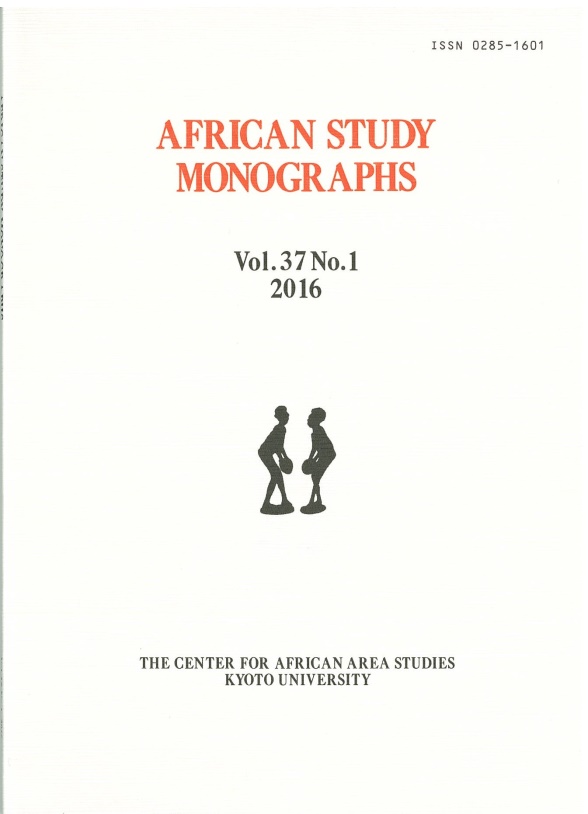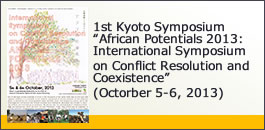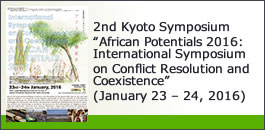Date: May 16, 2015. 10:30-11:40
Venue: Small-sized seminar room II, 3F Inamori Foundation Memorial Bldg., Kyoto University
Program

10:30-10:40
OHTA Itaru (Kyoto University)
Introduction
10:40-11:10
MATSUMOTO Tomoko (Nagoya University)
Change of Islamic education in Senegal society: A case study of Franco-Arab school
11:10-11:40
YAGI Tosuke (Ritsumeikan University)
Anthropological Study of Slum Tourism in Africa: With special reference to ‘Commercialized Persona’
Summary
Change of Islamic education in Senegal society: A case study of Franco-Arab school
MATSUMOTO Tomoko (Nagoya University)
Senegal has stated the principle of separation of government and religion in the constitution since its independence in 1960. Therefore, the secular curriculum, which French colonial government introduced, has been taking over in the official educational system even though the majority of people were Muslim. However, since 2002, public “Franco-Arab schools”, which implemented the bilingual education with French and Arab, have been constructing, and the number of school has been increasing up to now. In 2004 of the era of President Wade, Islam was introduced in the official curriculum according to the Amendment of Presidential Decree. Private “Franco-Arab schools” introduce official curriculum or develop appropriate education facilities because they want to be authorized by the government. Furthermore, the policy of modernization of “Daara” exists, which is Senegalese traditional Koranic School. The government wants to deal the number of participants in Daara as the number of students of official schools. These surrounding changes of Islamic education may affect on educational way; it has been situated in the informal sector and been well organizing and systemizing by Islamic Sufi leaders for a long time.
In this presentation, the change of Islamic education due to the introduction of Islam into the official curriculum will be discussed with a case of “Franco-Arab primary school.” The presenter did two field researches in 2014 and 2015 at two public and two private schools in Kaffrine and Kaolack regions. Interviews with students, parents, teachers and inspectors were conducted as well as collecting of related documents. After that, qualitative analysis on the change of traditional Islamic education was done with aspects of the educational system, students’ and parents’ expectations for Franco-Arab schools, and the change of their attitude towards Islamic education.
At public Franco-Arab primary schools, the curriculum, the textbooks and the examination system have been upgrading to some extent. The majority of students went on to the junior high schools in 2014 thanks to the policy with that they can go on to the junior high schools even if they cannot succeed in the examination of certificate of primary level. On the other hand, private schools are divided into the ones, which are deploying their own curriculum, and the others, which are following the government curriculum. Both of them tend to hope to be authorized by the government. The average age of students at private schools is higher than the public schools because they pass by Daara before entering into the primary school and come back to the schools after the experience of working, the marriage and the birth. This tells that the positioning of private Franco-Arab schools is different from the public ones.
Both students and parents at public and private schools expect at first to become a good Muslim through the school education. They prioritize to develop the basic human aspects as Muslim and follow the knowledge to survive in the life such as French and other secular subjects. Some students and teachers of private schools are living in the site of schools and being looked after by the Islamic leader. They seem to understand that the education is one of Islamic practices.
Franco-Arab schools are responding to the needs of people because they can learn Islam and the knowledge for the life at school. The number of students of Franco-Arab schools has increased and some of them are observed no to go to Daara or Arab school before entering to the primary schools. Further, the official curriculum and pedagogy are different from the traditional Islamic education institution.
Anthropological Study of Slum Tourism in Africa: With special reference to ‘Commercialized Persona’
YAGI Tosuke (Ritsumeikan University)
In the 1990s, slum tour in which people experience ‘slum culture’ in slums of the Global South began. There are several reasons why the slum tour has developed in the third world countries: 1) they are less expensive. 2) It develops pro-poor tourism aimed at poverty reduction. Until now, studies about slum tourism concentrate on 3 arguments: 1) motives of tourists. 2) A change of the recognition of tourists to slum culture through the slum experience. 3) The tourism development by country, an international organization and NGO. Arguments about inhabitants’ practice have had no place in these researches, therefore this research focuses on how people accept or cope with slum tour. On how they create a social space of their own for becoming a tourist attraction. The research was conducted on Nairobi, Johannesburg and Cape Town to understand the characteristic of slum tours. I investigated differences about the relation between inhabitants and tourists among three research areas.
First, I describe the contents of slum tour in Nairobi, Johannesburg and Cape Town and then analyze relationship between tourists and inhabitants in their areas. The standardization of tour content was seen in most companies in South Africa, and a place for sightseeing and the route that tourists visited were limited to the sites related to apartheid. In contrast, a lot of tours by “the informal sector” have been developed in Kenya. Therefore, there is possibility that slum tour is carried out in their private space of slum inhabitants, and their areas have accidental encounters between inhabitants and the tour.
I focus on ‘commodified persona’ that is created expediency to present their ‘culture’ for tourists in order to protect their life-world from drastic change by the tourism. The people living in multi-ethnic area such as slum not only manipulate ‘persona’ for tourists but also maintain a good relationship among the different ethnic groups. In this research, I focus on how they apply their daily practices of manipulating persona to tourism and how they re-establish their ‘life-world’ through the tourism. I would like to argue the ethic of slum tourism from the views of slum inhabitants.


 Exploring African Potentials, Mila Special Issue
Exploring African Potentials, Mila Special Issue
